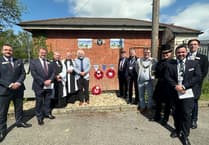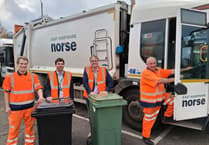Have you noticed that a brand-new sport is rapidly gaining popularity? Road slalom. The object is for drivers to skilfully and safely avoid all potholes while maintaining their normal driving speed.
This sport is endlessly challenging. As skill levels rise, more potholes appear and the existing ones get bigger.
Potholes have replaced recycling as the number one in the “things that people want fixed” charts. Recycling is still right up there in the top ten though (usually number two).
For a district councillor, potholes are a difficult issue to deal with. Road maintenance is not the job of district councils.
In our area, Hampshire County Council is responsible for this work. On the other hand, waste disposal, which includes recycling, of course, is a matter for district councils.
District councils collect domestic waste. This is called kerbside collection. The waste is handed over to waste management contractors for disposal.
All district councils in Hampshire use Project Integra. As we all know, Project Integra accepts only a very limited range of material for recycling.
District councils are not limited to using Project Integra. They can use other waste management contractors too. This could greatly increase the range of materials recycled in East Hampshire.
Where the East Hampshire District Council fails, volunteers from Alton Climate Action Network succeed. They have organised a network of Terracycle points across Alton. This is a scheme sponsored by companies to recycle the waste that they produce – mainly packaging.
The scheme does not have the convenience of kerbside collection, but we are all well used to using bottle banks in different places.
If ACAN can do it in Alton, why can’t EHDC do it in East Hampshire? It is deeply ironic that our district council was boasting about the ACAN scheme in one of its latest public information circulars.
The answer is cost. Yet everyone in East Hampshire wants better recycling.
There is a confidence trick at the heart of this. The Conservative Party has convinced us we can have something for nothing. They tell us we can pay low taxes and still get a first-class service.
The current state of the National Health Service exposes this con. As does the omnipresence of potholes.
Yet this need not be. The community should consider wealth as well as wages for raising the funds that it needs.
If the wealthiest five per cent of the community were to contribute the same proportion of their wealth as the other 95 per cent of us, we could have first-class services.
We all live in the same society. Is it not fair that we should all contribute the same proportion of our wealth to make it a decent society?
Of course, this would not be popular with the likes of Rishi Sunak. But the wealthy can easily afford private health care. They can helicopter over the pothole-raddled roads.
A decent fair society needs a decent fair tax system. A decent fair tax system has a robust wealth tax as its foundation.





Comments
This article has no comments yet. Be the first to leave a comment.